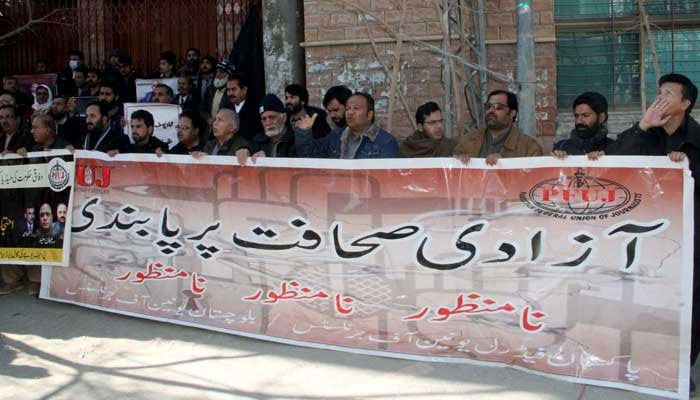Under pressure
Cumulative impact has been to make jobs of those in industry today harder and riskier than ever
Whether it is through draconian laws, arbitrary restrictions of social media platforms, lack of access to information, financial pressure, boycotts and even failure to protect journalists from violence, Pakistan keeps throwing up new ways to stop the country’s media from doing its job. This is one area where the country seemingly does not lack for innovation and new methods to make journalism difficult are discovered pretty much every year. The cumulative impact has been to make the jobs of those in the industry today harder and riskier than ever. Journalists have been left with little choice but to try and do their best in their current circumstances and raise a voice of protest against the status quo and hope for some change. This hope often goes unrewarded but it is not for a lack of trying. The latest to try is the Association of Electronic Media Editors and News Directors (Aemend), which expressed deep concern over the state of media freedom in Pakistan on Thursday, saying that "every possible tactic" was being used to suppress dissent. These comments came as the media body's executive committee held a meeting to review the challenges faced by the media in the country. Aemend highlighted that the pressure on television channels is aimed at exerting maximum control over the media and silencing dissent and criticised the Pakistan Electronic Media Regulatory Authority (Pemra) for acting as a rubber stamp, issuing illegal notices daily to bring television channels under pressure.
The media body also focused on how certain media organisations were being harmed financially via the halting of advertisements due to disapproval of editorial policies and the impact of the ongoing internet interruptions and restrictions. Aside from access to certain social media platforms being disrupted, depriving journalists of their voice and access to information, there is also the case of journalists being targeted under the guise of legal and moral restrictions on social media. Amidst all this pressure from the state, one would expect political parties to lend a helping hand. After all, without a free and independent media, how can there be free and independent politics? It also does not help that popular political leaders often level false accusations of the media being corrupt or biased and tend to use it as a punching bag. The popular perception in the country now is that traditional or legacy media is not to be trusted, despite most independent analyses showing that legacy media is generally accurate.
The maligning and silencing of those who actually produce accurate news has a lot to do with the drift towards fake news and the tightening chokehold of conspiracies and malicious narratives over the political and social ecosystem. While media in the developed world worries about how to stay relevant in the age of social media, Pakistani media houses worry about how to get on social media. While those in power should be worried about the media holding them accountable, in Pakistan journalists worry about the next legal steps that will be taken against them. And things may only be getting worse, with the government reportedly seeking to establish two new authorities with extensive powers to regulate digital content, investigate breaches, and prosecute offenders via amendments to the Prevention of Electronic Crimes Act (Peca) 2016. This is a law that experts already say has been abused to target journalists and muzzle free speech and it might be about to get a major boost. Aside from journalists, all those who benefit from an environment where information is trustworthy and authority can actually be held to account will suffer.
-
 Leonardo DiCaprio's Girlfriend Vittoria Ceretti Given 'greatest Honor Of Her Life'
Leonardo DiCaprio's Girlfriend Vittoria Ceretti Given 'greatest Honor Of Her Life' -
 Beatrice, Eugenie’s Reaction Comes Out After Epstein Files Expose Their Personal Lives Even More
Beatrice, Eugenie’s Reaction Comes Out After Epstein Files Expose Their Personal Lives Even More -
 Will Smith Couldn't Make This Dog Part Of His Family: Here's Why
Will Smith Couldn't Make This Dog Part Of His Family: Here's Why -
 Kylie Jenner In Full Nesting Mode With Timothee Chalamet: ‘Pregnancy No Surprise Now’
Kylie Jenner In Full Nesting Mode With Timothee Chalamet: ‘Pregnancy No Surprise Now’ -
 Laura Dern Reflects On Being Rejected Due To Something She Can't Help
Laura Dern Reflects On Being Rejected Due To Something She Can't Help -
 HBO Axed Naomi Watts's 'Game Of Thrones' Sequel For This Reason
HBO Axed Naomi Watts's 'Game Of Thrones' Sequel For This Reason -
 King Charles' Sandringham Estate Gets 'public Safety Message' After Andrew Move
King Charles' Sandringham Estate Gets 'public Safety Message' After Andrew Move -
 Lewis Capaldi Sends Taylor Swift Sweet Message After 'Opalite' Video Role
Lewis Capaldi Sends Taylor Swift Sweet Message After 'Opalite' Video Role -
 Brooklyn Beckham Plunges Victoria, David Beckham Into Marital Woes: ‘They’re Exhausted As It Seeps Into Marriage
Brooklyn Beckham Plunges Victoria, David Beckham Into Marital Woes: ‘They’re Exhausted As It Seeps Into Marriage -
 Sarah Ferguson Joins Andrew In ‘forcing’ Their Daughters Hand: ‘She Can Lose Everything’
Sarah Ferguson Joins Andrew In ‘forcing’ Their Daughters Hand: ‘She Can Lose Everything’ -
 'Bridgerton' Author Reveals If Actors Will Be Recast In Future Seasons
'Bridgerton' Author Reveals If Actors Will Be Recast In Future Seasons -
 50 Cent Super Bowl Ad Goes Viral
50 Cent Super Bowl Ad Goes Viral -
 'The Housemaid' Lifts Company's Profits: Here's How
'The Housemaid' Lifts Company's Profits: Here's How -
 Michael Douglas Recalls Director's Harsh Words Over 'Wall Street' Performance
Michael Douglas Recalls Director's Harsh Words Over 'Wall Street' Performance -
 Henry Czerny On Steve Martin Created Humor On 'Pink Panther' Set
Henry Czerny On Steve Martin Created Humor On 'Pink Panther' Set -
 Lady Victoria Hervey: Andrew Mountbatten-Windsor's Ex-girlfriend Proud Of Being On Epstein Files
Lady Victoria Hervey: Andrew Mountbatten-Windsor's Ex-girlfriend Proud Of Being On Epstein Files




